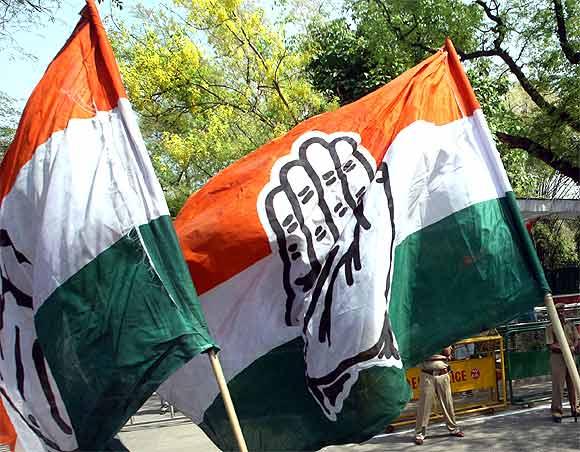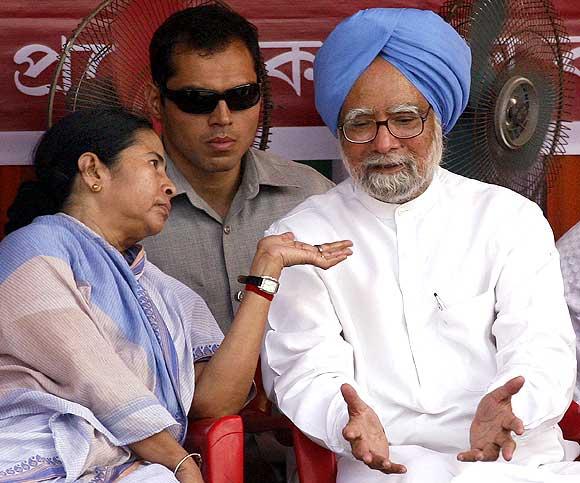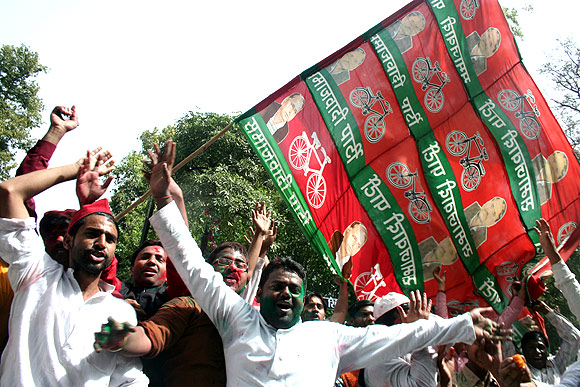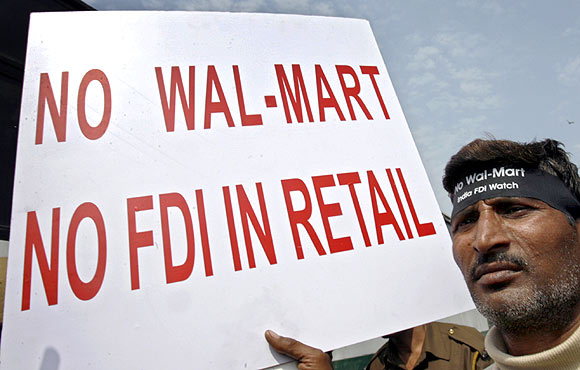
The next 10 days will tell you whether the United Progressive Alliance and its leading constituent, the Congress, have learnt the right lessons from their poor performance in the assembly elections held in Uttar Pradesh, Punjab and Goa.
The Congress victory in Manipur and Uttarakhand (with a narrow margin) is relatively less significant when it comes to altering the party's own assessment of its overall performance in the five-state election.
Political analysts will offer a range of explanations for the Congress debacle. Did charges of corruption against the UPA government do any damage? Did its patchy performance at the Centre since its re-election in May 2009 influence the voters in these states negatively? Or was it the Congress' failure to present a strong and stable team of local leaders in the four states?
Yes, Rahul Gandhi was there to campaign for the party in Uttar Pradesh. But voters are more politically astute than even politicians. They were perhaps unconvinced by a leader who was there only for effect and glamour, and would not take charge of the state if elected to power.
Please ...
For the latest on the UP election, please check Rediff Realtime News

How will the Congress respond to what has emerged as its biggest political challenge? There are three possibilities. One, it goes into a shell and becomes more defensive and tentative in its governance.
Its partners in the UPA could see this as an opportunity to assert themselves even more on the way the Union government administers policies, including those in the sphere of business and economy. That would be unfortunate. The Congress will suffer from an even more serious and prolonged policy stasis.
Imagine a situation in which Mamata Banerjee of the Trinamool Congress puts more pressure on the Union government to apply the brakes on pension sector reforms and liberalisation of foreign direct investment rules for the insurance and retail sectors.
All these measures needed to be taken long ago -- but the UPA government simply could not go ahead, mainly because a key member of the alliance opposed them. If the Congress goes into a shell after yesterday's results, the country should be ready to face the adverse consequences of stalled economic reforms.
Please ...
For the latest on the UP election, please check Rediff Realtime News

Two, the Congress could simply ignore the poll verdict and press its foot down sharply on the reforms pedal. Instead of worrying about how it fared poorly in the states, it could try to salvage the reputation of its government at the Centre by presenting a budget that reduces the fiscal deficit, slashes subsidies or ensures their delivery to the real poor and paves the way for enhancing investment in infrastructure. All these measures are likely to help boost economic growth.
In theory, such a scenario cannot be ruled out. It is possible because the UPA government's leader, Prime Minister Manmohan Singh, should no longer be under attack from many of his party colleagues now that almost all of them have bitten the dust in these elections. Also, there should now be an end to the clamour for a change of prime minister and the induction of Rahul Gandhi as a possible replacement.
Ironically, the Congress' poor performance in these polls may have given Manmohan Singh some elbow room to act more decisively in the coming days. Will that really happen? It is extremely unlikely, going by the past performance of the Manmohan Singh government.
The third possibility is that the Congress leadership recognises reality and explores better relations with the Samajwadi Party, which is now firmly in the saddle in Lucknow. Samajwadi Party leaders will not ignore overtures from the Congress at this point. There is a mutual need for the Congress and the SP to come closer to each other.
Please ...
For the latest on the UP election, please check Rediff Realtime News

Stronger ties with the SP will help the Congress in dealing with the Trinamool Congress or the Nationalist Congress Party, if either of them tries to put undue pressure on the UPA leadership on any issue. For the SP, too, a helpful government at the Centre would be a big advantage.
It is true that there are contentious economic policy issues that might come in the way of the two parties coming close to each other. For instance, the SP is opposed to allowing FDI in the retail sector, and the UPA government is keen on opening up the sector. Indeed, it had to roll back an earlier decision to allow FDI in retail because of intense pressure from the Trinamool Congress.
But the SP is also a pragmatic political outfit. Remember that its leaders helped the UPA at a crucial time in its first term, when the India-United States civilian nuclear deal was in trouble. There is no reason why the Manmohan Singh cannot reach out to the same leaders again and make sure that his government's agenda for economic reforms is implemented without further political hurdles.
Of the three options, the most viable and effective strategy for the Congress is to build a new alliance with the SP, with an implicit understanding of issue-based support to each other. Instead of being either ultra-defensive or over-aggressive, it is better for the Congress to be pragmatic.
Please ...
For the latest on the UP election, please check Rediff Realtime News